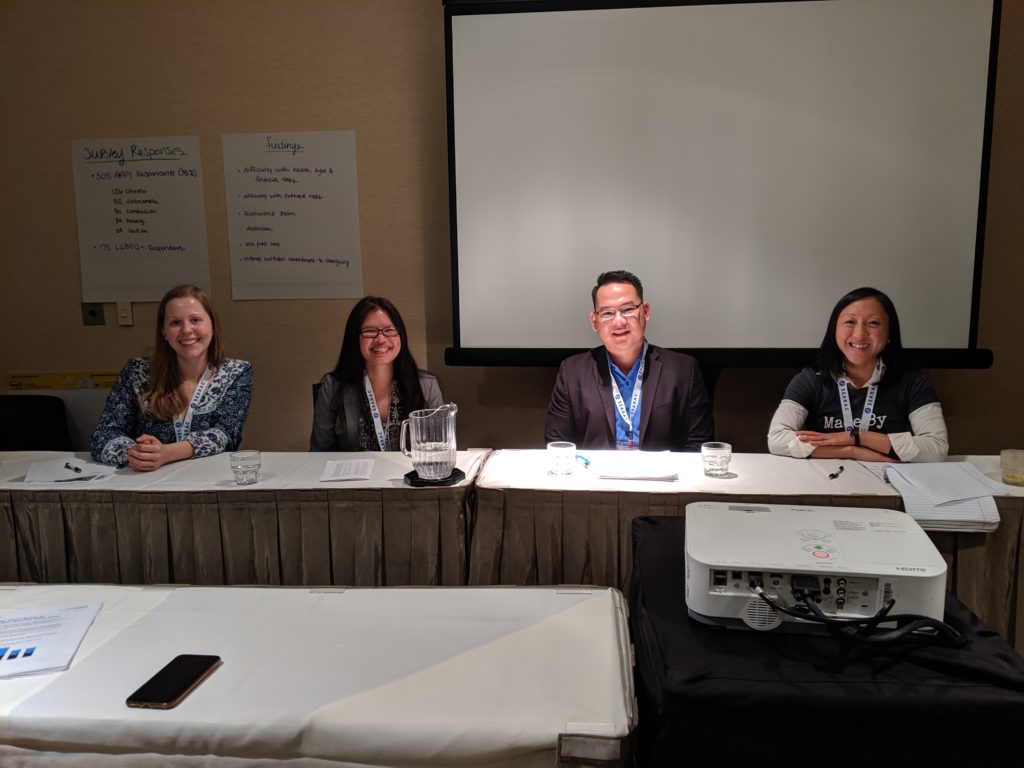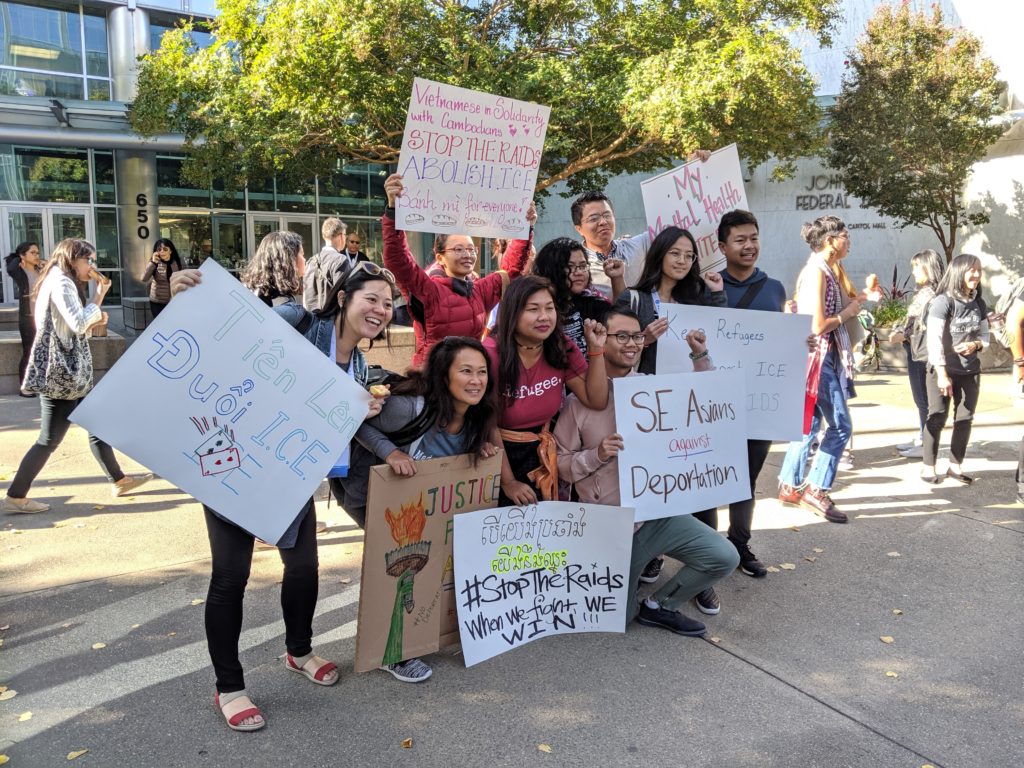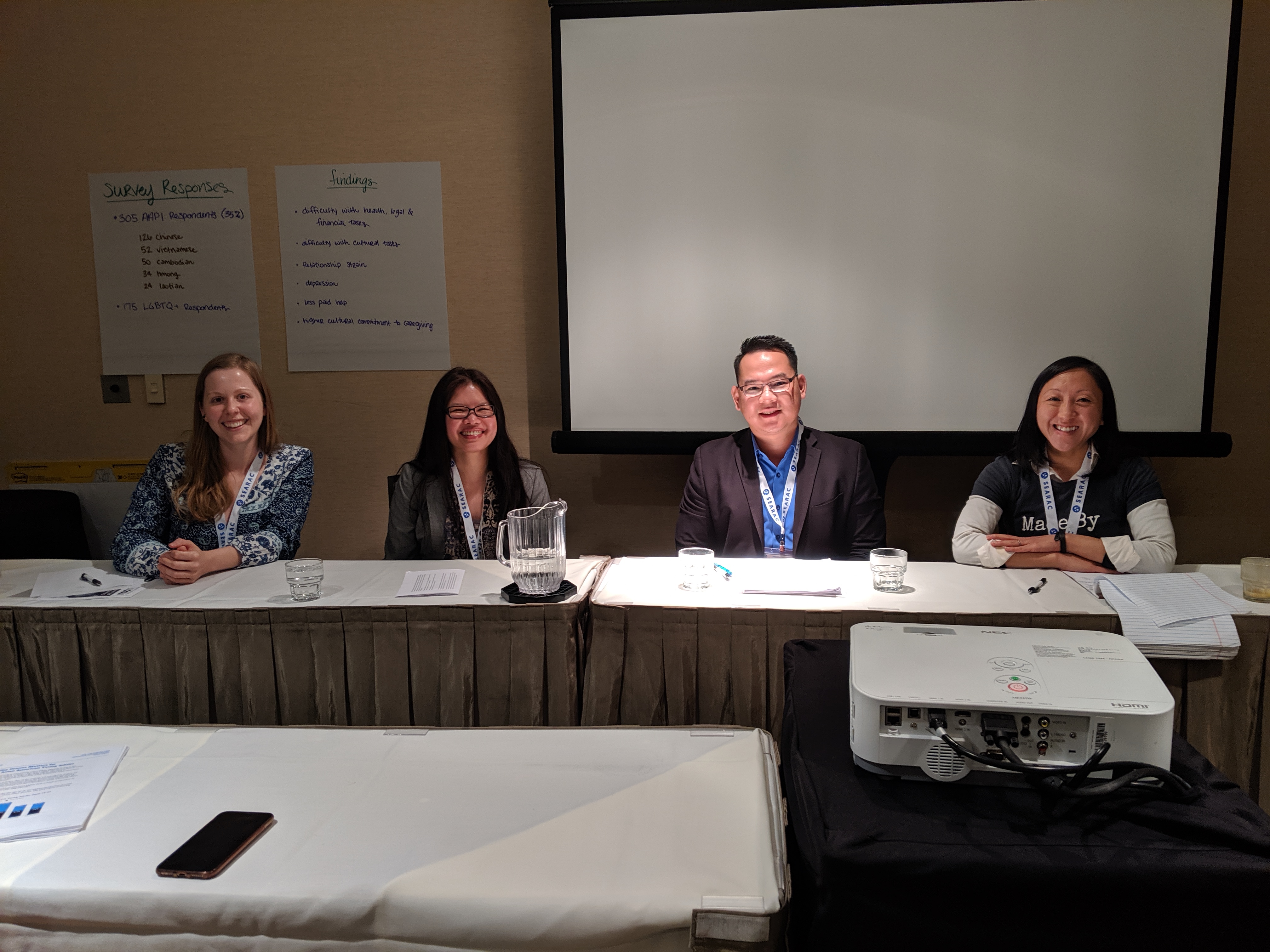An event hosted by the Southeast Asia Resource Action Center (SEARAC) is always sure to be filled with thoughtful, inspirational, and powerful moments, but none as powerful as the Diverse Elders Coalition’s family caregiving presentation at this year’s Moving Mountains Equity Summit in Sacramento, CA. I was thrilled to be able to share some of the preliminary findings of our family caregiving research, which has been generously supported by The John A. Hartford Foundation. After months of collecting surveys and conducting focus groups, it was exciting and satisfying to be able to share the results of our work with an audience of people most impacted by the programs and policies that will result.

Panelists for “Family Caregiving in Southeast Asian American Communities” at the 2019 SEARAC Moving Mountains Equity Summit. From left: Jenna McDavid, Jannette Diep, Vattana Peong, and Quyen Dinh. (photo courtesy of SEARAC)
Many of our audience members attending the discussion self-identified as family caregivers for older adults, which made our work that much more relevant and impactful. “My mom is the only person in her family who came to the United States,” one participant shared. “She’s very isolated and is in need of more local resources and connections.
“My parents live overseas and are heavily dependent upon one another,” said another audience member. “I’m really worried about what will happen when one of them dies. They’re so far away, and I have a family of my own here in the U.S.”
Our research has pointed to some interesting findings for the Southeast Asian American community specifically, and we were glad to have the disaggregated data to back up the lived experiences and the stories that Southeast Asian American caregivers have been telling us for years. More than 1 in 4 of the Southeast Asian American caregivers (identified as either Cambodian, Hmong, Lao, or Vietnamese) in our survey reported some difficulty or a great deal of difficulty helping their care recipients with activities of daily living, healthcare, or legal and financial tasks. One in three reported some difficulty or a great deal of difficulty assisting with “cultural tasks,” which we defined as translating documents, interpreting at a healthcare provider’s office, or assisting with immigration paperwork and processes. In fact, across all the groups surveyed during this research, if a caregiver was assisting a care recipient with those cultural tasks, they were statistically likely to be experiencing greater strain – on their physical health, their emotional health, and their social health – than caregivers who were not. Additionally, among all of the groups we surveyed, Southeast Asian American caregivers reported some of the highest rates of relationship strain between themselves and their care recipients.

Attendees of SEARAC’s Moving Mountains summit also demonstrated at the state capitol in support of Cambodian families facing deportation. Deportations have increased significantly in the Southeast Asian American communities, often robbing families of caregivers for older adults. (photo: Jenna McDavid)
Our panelists – including Quyen Dinh, Executive Director of SEARAC; Jannette Diep, Executive Director of Boat People S.O.S. in Houston; and Vattana Peong, Executive Director of The Cambodian Family – were all involved in translating materials, surveying caregivers, and hosting focus groups throughout the past ten months of this project. The constituents they spoke with and surveyed echoed many of the comments made by the audience during our discussion. Vattana talked about the ways that the Cambodian caregivers and elders that his organization serves struggle to navigate complex healthcare systems, often without anyone in the system who speaks their language; indeed, there is only one Cambodian-speaking medical doctor in all of Orange County, where The Cambodian Family is located.
Jannette noted that the focus groups were the first time that many of BPSOS’ caregiver clients had been asked about their experiences as caregivers, and that they were hungry for more opportunities to tell their stories and to receive support and training. “We have a lot of work to do,” she said, noting that forging connections with others in the coalition, like SEARAC and The Cambodian Family, were valuable opportunities for community-based organizations to develop caregiver-focused programming and identify sources of funding for their work.
Quyen echoed Jannette’s sentiments about the value of the coalition’s networks of community-based organizations – many of whom we were able to support through subgrants for this caregiving research project – to connect directly with Southeast Asian American elders and caregivers across the country. It’s clear that more support, resources, and training are needed to improve the health and wellbeing of diverse family caregivers; having this groundbreaking research at our disposal will ensure that funders, policymakers, and providers will take our caregiving concerns seriously. And conducting that research wouldn’t have been possible without the trusted messengers and the strong connections provided by the organizations and partners in the Diverse Elders Coalition.
A full report on the results of our survey and focus groups is forthcoming. Stay tuned to our blog as we continue to roll out our findings! For more information on our caregiving work with The John A. Hartford Foundation, click here.
The opinions expressed in this article are those of the author and do not necessarily reflect those of the Diverse Elders Coalition.

